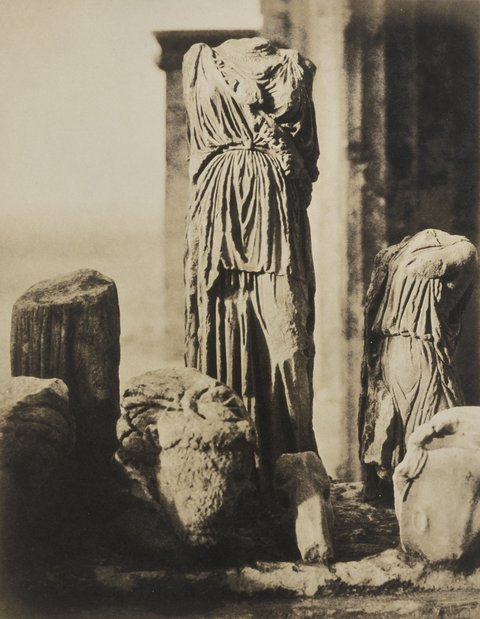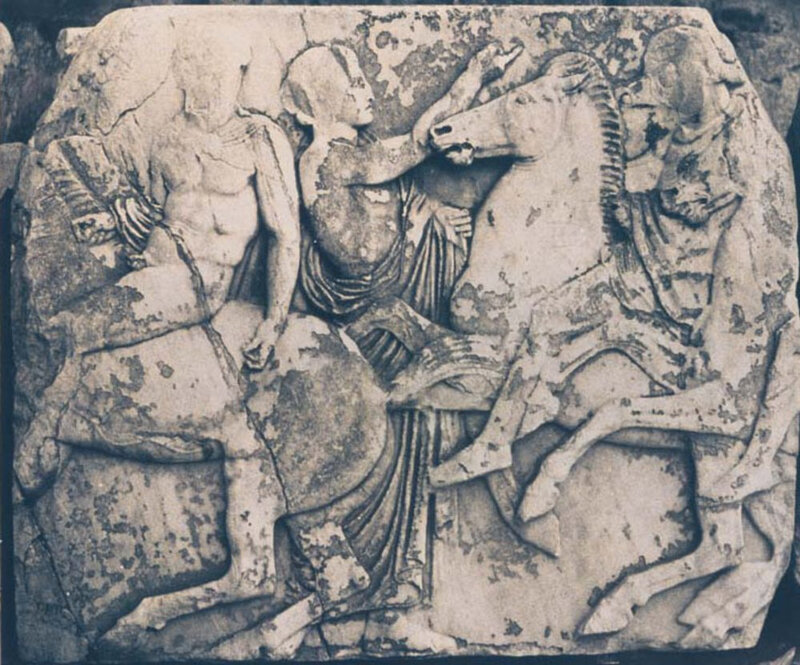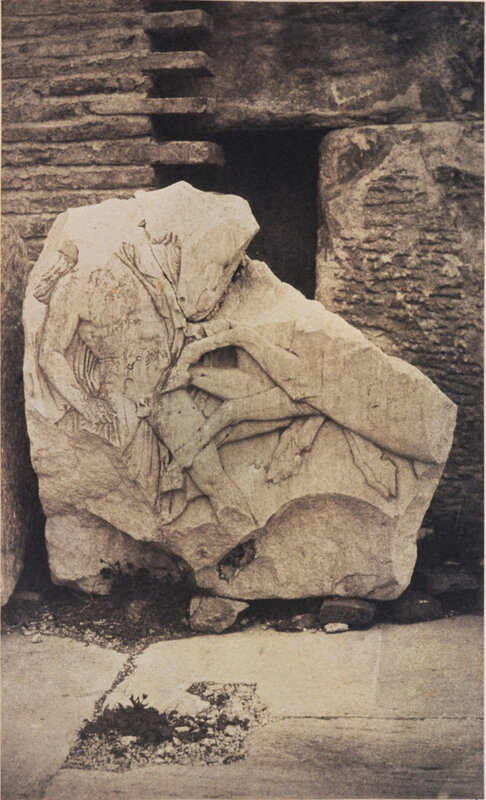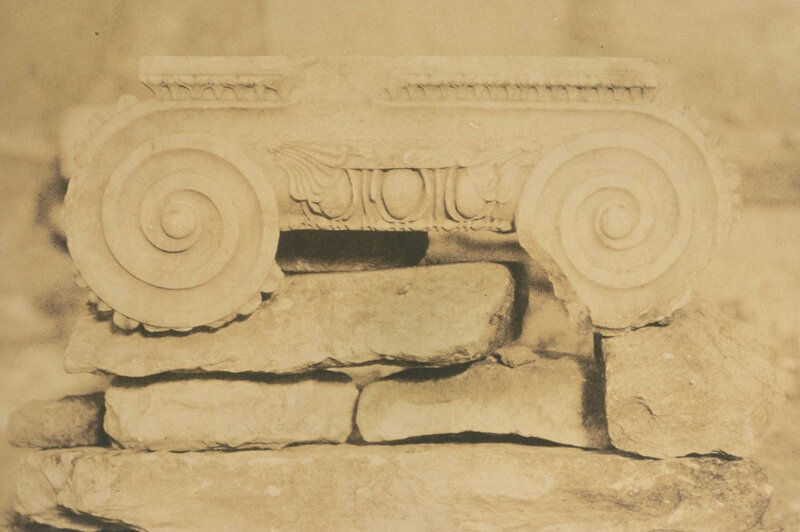'Silent Ruins, F. A. Oppenheim photographs the ancient world' at the Ludwig Museum
Felix Alexander Oppenheim, Acropolis, Athens, 1853, Museum Ludwig, repro: Rheinisches Bildarchiv Cologne.
Cologne - The ruins of the Acropolis seem to lie still when Felix Alexander Oppenheim photographed them in 1853. No one is to be seen, contemporary Athens remains hidden. 42 of his photographs appeared in 1854 in the large-format illustrated book of Athenian Antiquities, consisting of two booklets: The Acropolis and Details of the Acropolis. One of the two surviving specimens is in the Ludwig Museum; the second is in the J. Paul Getty Museum, Los Angeles.
Like Paul de Rosti, whose photographs from South America for Alexander von Humboldt the Museum Ludwig presented last year, the lawyer Oppenheim learned photography from Gustave Le Gray in Paris. Previously a jury in Cologne had acquitted him and his friend Ferdinand Lassalle of stealing documents, thus precluding any possibility of a legal career. And so Oppenheim traveled. But the much-cited “silent grandeur” of the ancient relics, as captured by Oppenheim, does not obscure the traces of looting and destruction, as well as archaeological recovery. For instance, in his introductory texts Oppenheim speaks of the “genius and great mastery with which the ancients knew how to treat this branch of art [sculpture]” and at the same time of “rummaging in foreign countries” and the &ldquo ;abduction” of sculptures. For the first time, the full album will be on view. It reveals a moment in history when the enthusiasm for antiquity, early archeology, the Greek symbol politics, and the struggle for rightful ownership created for these silent ruins a context rich in words and images.
Felix Alexander Oppenheim, frieze of the Parthenon, 1853, Museum Ludwig, repro: Rheinisches Bildarchiv Köln
The exhibition will be accompanied by a publication: Felix Alexander Oppenheim, a Traveling Photographer in Athens in 1853: Searching for Traces, edited by Miriam Szwast, with a text by Matthias Weniger, 44 pages, 46 illustrations, 14.8 × 21 cm, stapled, English and German editions, €8, ISBN 978-3-9821480-3-8 (English), ISBN 978-3-9821480-2-1 (German).
Felix Alexander Oppenheim (1819–1898) is still an unknown figure among travel and architectural photographers of the nineteenth century. His works are scattered across museums and archives, and his unusual biography is only partially known. Over years of research, art historian Matthias Weniger was able to track down Oppenheim’s works and make discoveries in his family’s estate, which will now paint a more precise picture of the photographer and provide the foundation for further research. Weniger is now publishing his findings for the first time on the occasion of the presentation at the Museum Ludwig.
Felix Alexander Oppenheim, Acropolis, Athens. Frieze of the Parthenon, 1853, Museum Ludwig, repro: Rheinisches Bildarchiv Köln
The Museum Ludwig holds Oppenheim's magnificent album presented to King Frederick Augustus II of Saxony in 1854 with forty-two photographs of the Acropolis in Athens. The photographer, who trained under Gustave Le Gray in Paris, shows the condition of the ruins in the wake of looting, destruction, and weathering—sober, unadorned, and yet occasionally sublime. For the first time, all forty-two photographs will be published here.
Curator: Miriam Szwast.
February 15 - June 14, 2020
Felix Alexander Oppenheim, Acropolis, Athens. Chapter, 1853, Museum Ludwig, Repro: Rheinisches Bildarchiv Cologne.
Felix Alexander Oppenheim, The Erechtheion, Eastern View, 1853, Museum Ludwig, Repro: Rheinisches Bildarchiv Köln.
Felix Alexander Oppenheim, Acropolis, Athens. The Parthenon. Interior view, 1853, Museum Ludwig, repro: Rheinisches Bildarchiv Cologne.

/https%3A%2F%2Fprofilepics.canalblog.com%2Fprofilepics%2F1%2F0%2F100183.jpg)
/https%3A%2F%2Fstorage.canalblog.com%2F03%2F02%2F119589%2F96711876_o.jpg)
/https%3A%2F%2Fstorage.canalblog.com%2F11%2F31%2F119589%2F94773502_o.jpg)
/https%3A%2F%2Fstorage.canalblog.com%2F20%2F83%2F119589%2F94772815_o.jpg)
/https%3A%2F%2Fstorage.canalblog.com%2F26%2F72%2F119589%2F75604929_o.jpg)
/https%3A%2F%2Fstorage.canalblog.com%2F59%2F60%2F119589%2F26458628_o.jpg)








/image%2F1371349%2F20240423%2Fob_b2fe42_telechargement-9.jpg)
/image%2F1371349%2F20240423%2Fob_af8bb4_telechargement-6.jpg)
/image%2F1371349%2F20240423%2Fob_b6c4a6_telechargement.jpg)
/image%2F1371349%2F20240423%2Fob_981d5f_h22891-l367411650-original.jpg)